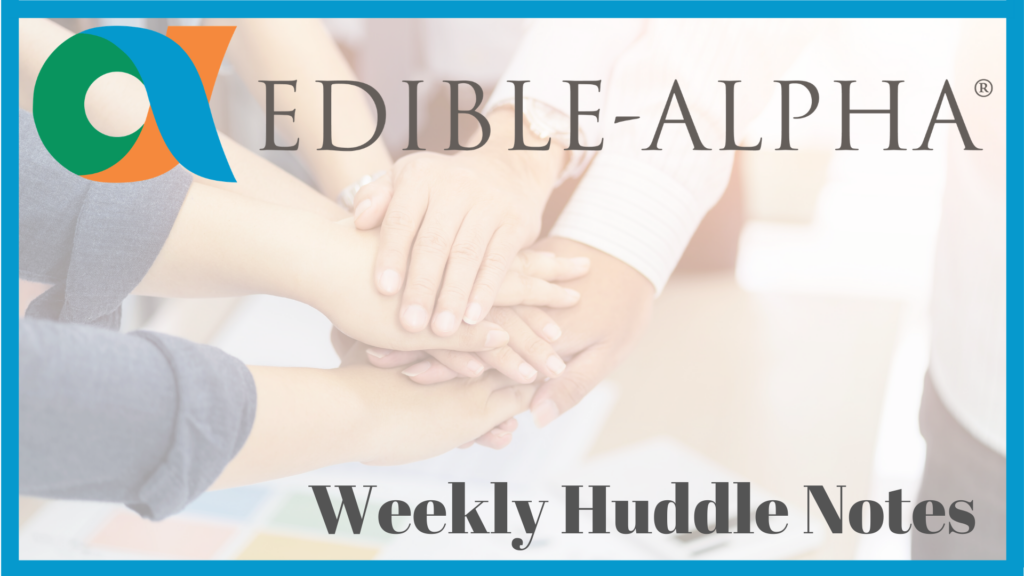The huddles this week focused on global climate innovations, news in the specialty foods sector including brand strategies, and updates on SBA funding.
Talking Points
- Climate news and insights
- Senate Ag Committee on Carbon Farming Legislation
- Sponsored by a Republican Senator Mike Brun (Indiana) & Democrat Debbie Stabenow (Michigan)
- USDA certification program for certifying consultants that will be working with farms to do carbon sequestration projects on the farm and verify the carbon has been sequestered.
- A mechanism to support carbon trading, which can enable the market to get much bigger.
- Ag Carbon Credits are selling for $13-$17/ton of carbon
- Netherlands collective of 200 farms signed an agreement that will create the largest on-land wind farm in Europe
- Large European Cooperatives – much more likely to be innovative
- US Cooperatives – innovation is lacking or slow
- Australian Craft Brewing trying to create technology to harvest CO2 to feed algae to create O2
- The carbon from 1 six pack of beer will take a tree 2 days to mitigate
- 1 tank of algae is equal to a hectare of trees – much more efficient
- Agriculture is right now seeing other ways to mitigate climate change especially regenerative ag and cover cropping, deployed at a very large scale (COVID has made this worse, particularly in animal agriculture and bi-chain breakdowns)
- Senate Ag Committee on Carbon Farming Legislation
- News from specialty food representation (fancy olive oil, etc.)
- General Mills
- Has a regenerative ag initiative that has and is underway, cover croppingheavy, started because of Annie’s brand. | News Release
- Could not source enough organic grains for Annie’s so GM bought acres in Kansas and converted conventional wheat to organic.
- Also did a similar purchase and implementation with 50,000 acres of oats in North Dakota.
- Created a supply chain for themselves and research to document the practices.
- Running extensive tests on land purchased to show how the benefits regenerative ag practices have on carbon sequestration.
- GM announced a dairy pilot with Foremost Farms, a cooperative based farm in Wisconsin, to show that transitioning to regenerative practices is economical viable
- Has a regenerative ag initiative that has and is underway, cover croppingheavy, started because of Annie’s brand. | News Release
- Supply Chain Contingency Plans
- Big Brands are anticipating fall supply chain problems, look ahead for supply chain issues and devise a contingency plan for businesses.
- Election could impact supply chain issues
- General Mills
- Small Business Administration Funding
- If a business defaults on an EIDL or PPP, there is a chance that the owner(s) will not be eligible to participate in SBA 7(a) or 504 or other loan programs in the future for any new business venture.
- PPP – What do you do with PPP? Do you owe that money to the federal government if you go out of business?
- May have a personal guarantee, as each bank wrote its own promissory note for the PPP program, each borrower needs to consult his/her/their own loan closing documents to understand their liability.
- EIDL
- Ag Lenders don’t like EIDL loans because they want to be doing the loans. Consider working with a non-banker for EIDL questions.
- If you have questions about 7a loans there are people to answerquestions about it, with EIDL there isn’t anyone to call
- If you take an EIDL loan and 2 years from now you have the money, you must get SBA’s permission to get a subsequent loan
- Talk to your clients about what they’re being offered because they’re trying to get rid of these funds and they’re giving businesses more than they really need or asked for.
- Before you accept the amount of the EIDL, you can change the amount to a lower amount.
- EIDL is an unsecured loan if the amount is under $25,000 and secured loan for amounts over $25,000.
- Verbal information received (this information is not confirmed via public availability or by a written source):
- Loan amounts between $25,000 and $200,000 are secured by non-real estate collateral
Trends
- Amounts of $200,000 or more do have a personal guarantee.
- Accepting EIDL funds may impact your business’ access to additionalcapital through traditional lending instruments/lenders.
- Consumers are looking for quick-scratch cooking – simple recipes, easy to make, quick to put together
- How could your business be solving this for consumers?
- Click and Collect is more popular (and less labor intensive) than delivery for grocery
- Utilizing lockers that are programmable to be a refrigerator, freezer, or ambient temperature. Can be assigned to whomever, send a code, no people needed to hand out orders, etc..
- COVID 19 has eliminated many well-loved products as brands reduce product offerings
- General Mills – before COVID hit had reduced their Amy’s brand SKUs from 228 to 71 and soups from 90 to 45. Reducing the offerings because of ingredient availability.Tips & Next Steps
- If you work closely with Food Systems – check out FoodShed | Website
- Connecting sustainable producers to local wholesale markets
- Schnucks is committing $5M towards local produce using FoodShed
- Think about how your business or products could be solving the quick-scratch cooking issue for consumers. How can your business/products offer simple recipes, plus easy to make and quick to put together meals?
- Reducing product offerings could be an excellent strategy for surviving in this economic climate, especially for smaller brands who are currently struggling.
- Do scenario planning to look ahead for supply chain issues and devise a contingency plan for your business
- Consumers are looking for quick-scratch cooking – simple recipes, easy to make, quick to put together
